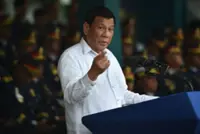MANILA (Philippine Daily Inquirer/Asia News Network): Chinese coast guard and militia vessels harassed Philippine ships in back-to-back incidents in Ayungin (Second Thomas) Shoal in the West Philippine Sea in April, according to a US think tank.
The two incidents in the Philippine-occupied atoll, which took place several hours apart, were tracked by the Washington-based Asia Maritime Transparency Initiative (AMTI) of the Center for Strategic and International Studies, a think tank that closely follows developments in the South China Sea using satellite images and transponder system.





